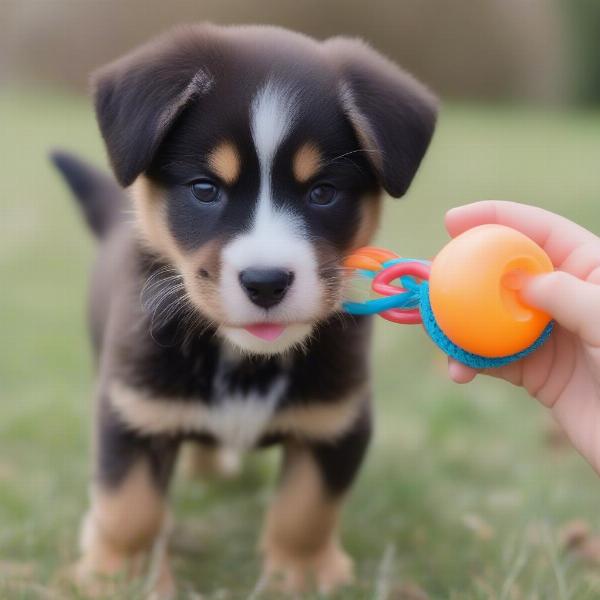Dog puffing cheeks, also known as cheeking, can look amusing, but it’s important to understand why our canine companions engage in this behavior. While sometimes it’s simply a quirky habit, it can occasionally indicate an underlying health issue. This article delves into the common causes of cheek puffing in dogs, helps you determine when to seek veterinary attention, and provides tips for managing this behavior.
Many dog owners have witnessed their furry friends puffing out their cheeks, holding food in their mouths without swallowing. This can be a perplexing sight, leading to questions about whether it’s a harmless quirk or a sign of something more serious. Understanding the various reasons behind cheek puffing, from simple food storage to potential dental problems, is crucial for responsible dog ownership.
Why Do Dogs Puff Their Cheeks?
Several reasons contribute to cheek puffing in dogs. Sometimes, it’s a perfectly normal behavior, while other times, it could signal a problem requiring veterinary attention. Let’s explore the common causes:
- Food Storage: Some dogs, especially those with a strong scavenging instinct, might puff their cheeks to store food for later. This is more common in breeds with a history of hunting or working roles. They might carry food to a safer location or simply save it for a later snack.
- Dental Issues: Painful teeth or gums can cause a dog to avoid chewing and instead hold food in their cheeks. This might be accompanied by other signs like drooling, bad breath, or difficulty eating.
- Oral Masses or Growths: Tumors or other growths in the mouth can make it difficult for a dog to swallow, leading to food accumulation in the cheeks.
- Neurological Problems: In rare cases, cheek puffing can be a symptom of a neurological disorder affecting the muscles involved in chewing and swallowing.
- Behavioral Quirks: Some dogs simply have a habit of puffing their cheeks, even without any underlying medical reason. This might be more common in certain breeds or individual dogs.
When to Worry About Dog Puffing Cheeks?
While occasional cheek puffing might be harmless, it’s important to monitor your dog for any accompanying symptoms that could indicate a problem. Consult your veterinarian if you notice any of the following:
- Persistent cheek puffing: If your dog is consistently puffing its cheeks, even without food in its mouth, it warrants a vet visit.
- Changes in eating habits: A sudden decrease in appetite, difficulty chewing, or dropping food from the mouth can be signs of dental or other oral issues.
- Excessive drooling or bad breath: These are common indicators of dental problems or infections.
- Swelling or pain in the face or mouth: If you notice any swelling, redness, or signs of discomfort, seek veterinary attention immediately.
- Other behavioral changes: Lethargy, withdrawal, or changes in personality can accompany underlying medical conditions.
Managing Cheek Puffing in Dogs
The best way to manage cheek puffing depends on the underlying cause. If it’s a behavioral quirk, you might try gently encouraging your dog to swallow the food. If it’s related to food storage, you can try feeding smaller, more frequent meals. However, if there’s a medical reason, veterinary treatment is crucial. Your vet might recommend dental cleaning, medication, or even surgery depending on the diagnosis.
Is Cheek Puffing in Puppies Normal?
Puppies, especially during teething, might puff their cheeks as they explore new textures and learn to chew. This is usually a temporary phase, but it’s still essential to monitor them for any signs of discomfort or difficulty eating.
 Puppy Puffing Cheeks While Teething
Puppy Puffing Cheeks While Teething
Conclusion
Dog puffing cheeks can be an amusing quirk or a sign of an underlying issue. Observing your dog’s behavior and seeking veterinary attention when necessary is crucial for their well-being. By understanding the potential causes and knowing when to seek professional help, you can ensure your furry friend stays healthy and happy.
FAQ
- Is cheek puffing always a sign of a problem? No, sometimes it’s just a quirky habit, especially if it’s infrequent and not accompanied by other symptoms.
- What should I do if my dog is constantly puffing its cheeks? Schedule a veterinary appointment to determine the underlying cause.
- Can dental problems cause cheek puffing? Yes, dental pain or discomfort can make it difficult for a dog to chew and swallow, leading to food accumulation in the cheeks.
- How can I prevent my dog from puffing its cheeks? The best approach depends on the cause. Behavioral quirks might require gentle encouragement, while medical issues necessitate veterinary treatment.
- Is cheek puffing more common in certain breeds? While not breed-specific, it might be more prevalent in dogs with a history of scavenging or working roles.
- What are the signs that cheek puffing is a serious problem? Persistent puffing, changes in eating habits, excessive drooling, bad breath, swelling, or pain in the face or mouth warrant immediate veterinary attention.
- Can neurological problems cause cheek puffing? Yes, although this is less common than other causes.
About ILM Dog: ILM Dog is your trusted resource for comprehensive dog care information, offering expert advice on breeds, health, training, nutrition, grooming, and much more. We’re committed to providing practical and reliable guidance to dog owners worldwide. For expert advice tailored to your dog’s specific needs, contact our team at [email protected] or +44 20-3965-8624.